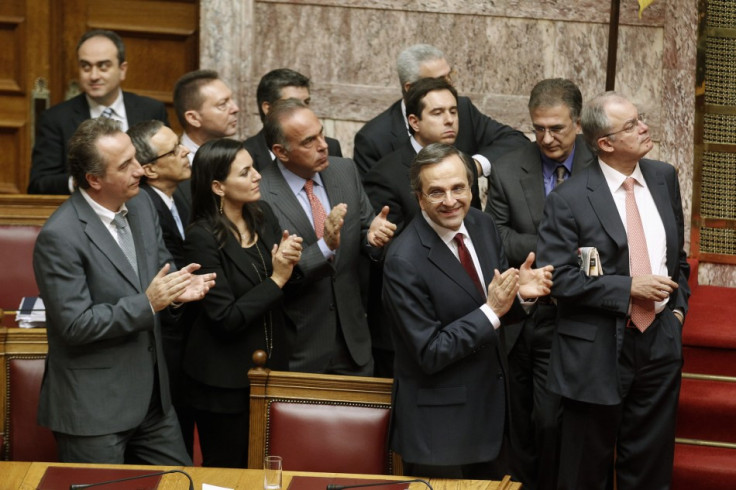Greece Needs An Extra Two Years and €32bn to Meet Bailout Targets

Greece may need an additional €32bn to plug the financial gap left by a two-year extension to the bailout terms agreed with its international lenders.
Reports from Bloomberg news, citing an advanced copy of the Troika report, suggest the extra time will require at least €15bn between now and 2014 and a further €17bn by 2016 if the adjustment schedule is lengthened by two years. If the schedule remains the same, Greece would need to find a further €20.7bn in savings, according to Germany's Die Welt, through even deeper austerity measures in an economy that's entering its 6 consecutive year of recession.
The Troika report - a name given to Greece's three main international lenders - will form the basis of discussion for Eurozone finance ministers meeting Monday evening in Brussels even though they are not expected to approve any further funding or establish any solutions for Greece despite the weekend's budget vote.
"I am impressed by Greece's recent performance," Eurogroup Chairman Jean Claude Juncker told reporters. "Greece is on track to meet its commitments step-by-step. There won't be any definitive decisions today, but I think there general feeling is that we would like the next disbursement done in the most efficient way possible."
Greece's lawmakers passed a controversial budget over the weekend that included more than €13bn in new spending cuts, tax increases and labour market reforms in an effort to appease the so-called Troika of the European Union, the International Monetary Fund and the European Central Bank and gain release of around €31.5 in funding from its previous bailout.
The reports suggest Greece has also arranged with the Troika to extend by two years its targets for debt and deficit reduction and to allow it more time to implement both the nine-month bailout and the austerity measures agreed by a narrow parliamentary majority last week.
Giving Greece an extra two years - and ostensibly funding the €17bn - could allow it to deliver a balanced primary budget (one that excludes debt payments) by 2013 and a primary surplus of 4.5 percent of GDP by 2016, a full two years more than agreed under terms of the "Second Fiscal Adjustment Programme" (FAP) agreed in March.
No new cash may be needed to plug the gap, however, if a combination of faster privatisations, lower interest rates on existing loans and a possible buyback of some of Greece's €120bn in debt can be agreed.
Several hurdles for the extension, the new funding and the release of its €31.5bn FAP tranche remain, however, not least of which is a parliamentary approve from German lawmakers. Dow Jones reported today that a vote could come to the Bundestag as early as next week but that would be too late for Greece to repay a €5bn treasury bill that comes due Friday. Reuters quoted a senior official in Greece's debt management agency earlier today saying his office would issue one and three months bills to cover the redemption and that there is "no problem" with that from the ECB's perspective.
The issue of Greece's short-term funding has been clouded by concerns that he nation won't meet debt sustainability targets agreed under the terms of its current bailout.
The European Commission's projections for Greece's debt, released earlier this week, suggest it will rise to around 190 percent of its GDP by 2014, making the long-term goal of reducing that figure to below 120 percent by 2020 nearly impossible to reach.
The EC expects Greece's economy to continue to contract in 2013, by as much as 4.2 percent, before advancing modestly in 2014.
The IMF can't, under its established rules, release its €1.6bn portion of the tranche unless there's a deal in place that would significantly improve these figures.
The Fund would like some form of "haircut", or partial debt forgiveness, from the so-called official sector (the ECB, various governments, etc.) but EU Economic and Monetary Affairs Commissioner Olli Rehn, and virtually every other senior politician or policy maker in Europe, has rejected that suggestion outright.
© Copyright IBTimes 2025. All rights reserved.





















